Abstract
It has been suggested that the relation between diet and breast cancer may depend on estrogen receptor (ER) status. We examined the responses to a self-administered questionnaire on frequency of consumption of various foods by 493 women with breast cancer (160 with ER-negative tumours and 333 with ER-positive tumours) and 527 controls whose menopausal status was known. Analysis of the reported consumption of foods selected for their fat or carotene content showed no clear distinction in dietary factors between the ER-negative and ER-positive groups. Frequent consumption of meat fats generally increased the risk of both ER-negative and ER-positive tumours; there were no clear trends in risk associated with vegetable consumption for either ER group. Fish was the only item affecting the risk for ER-negative and ER-positive tumours differently, frequent consumption reducing the risk for the former (p = 0.02). The results do not support the hypothesis that ER status influences the relation between dietary fat consumption and risk of breast cancer.
Full text
PDF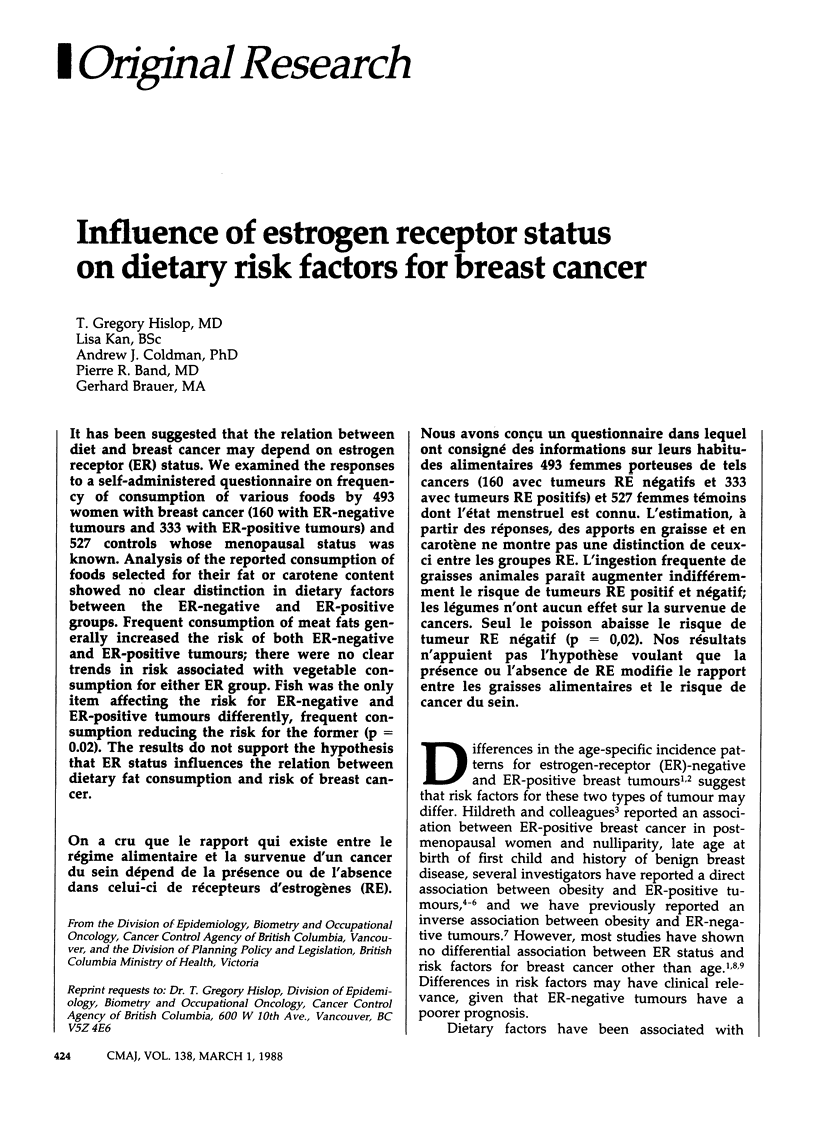
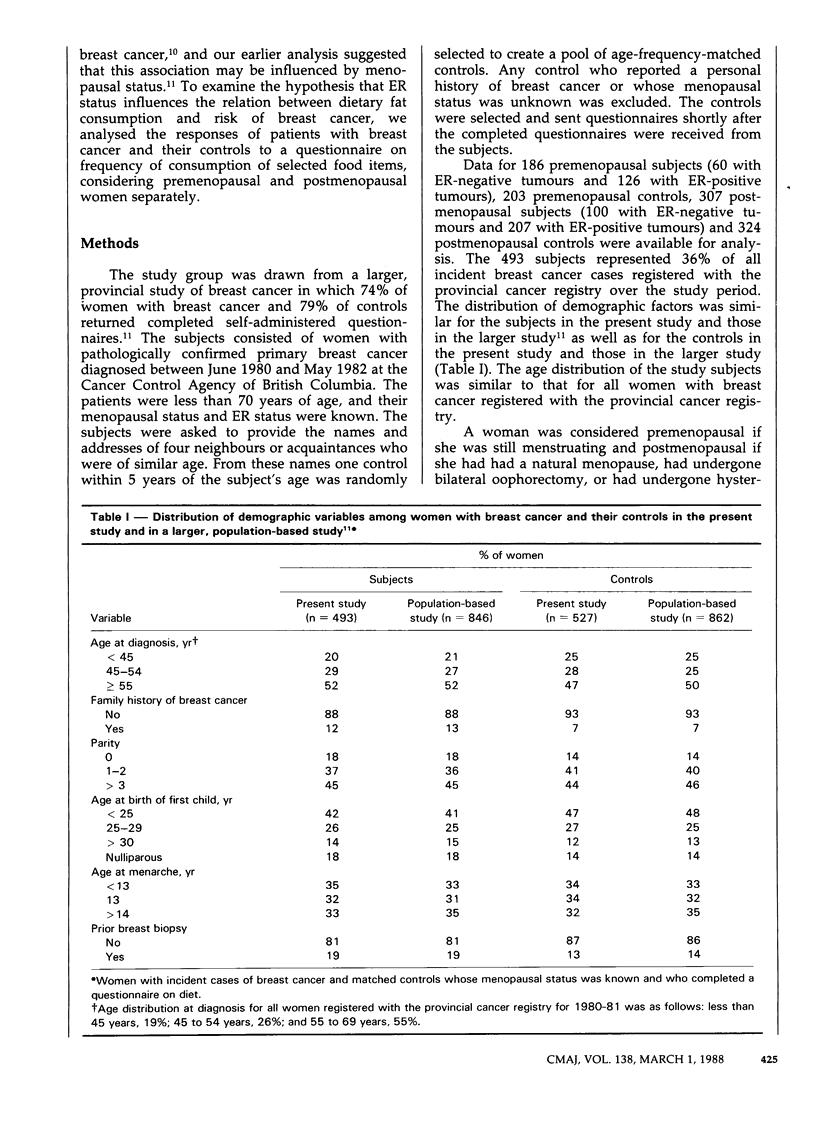
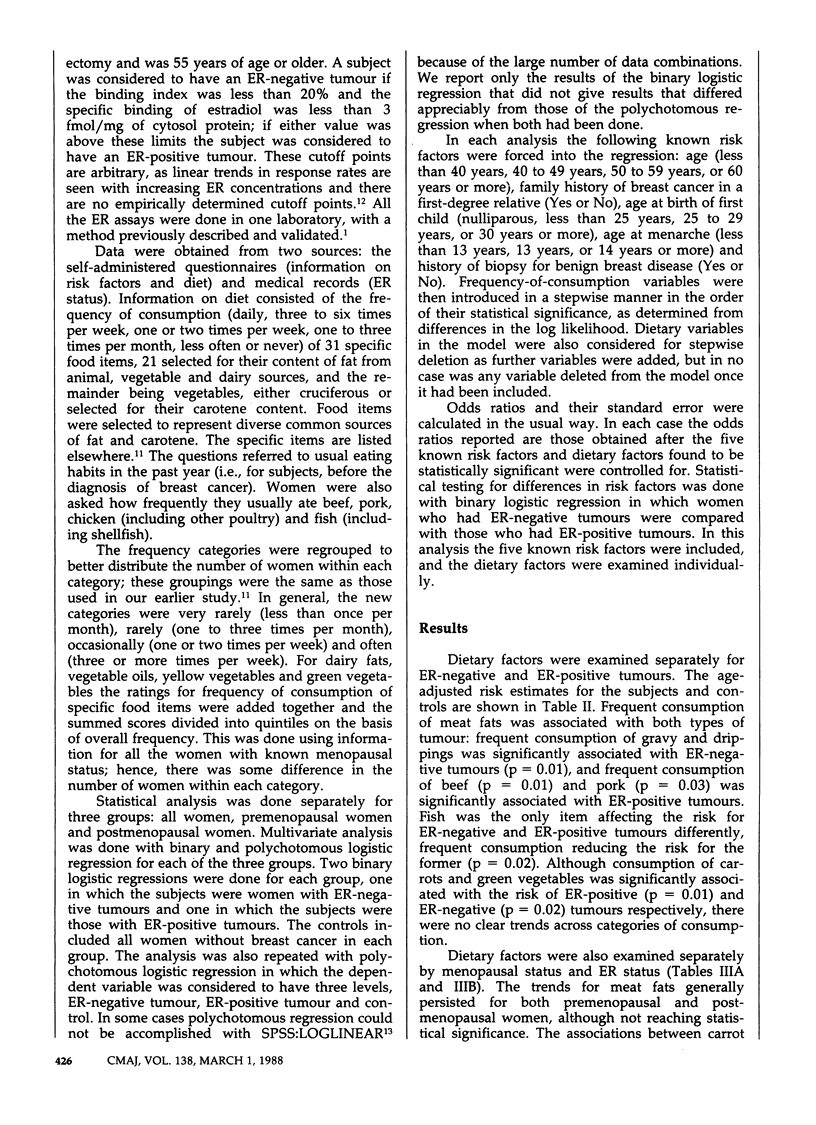
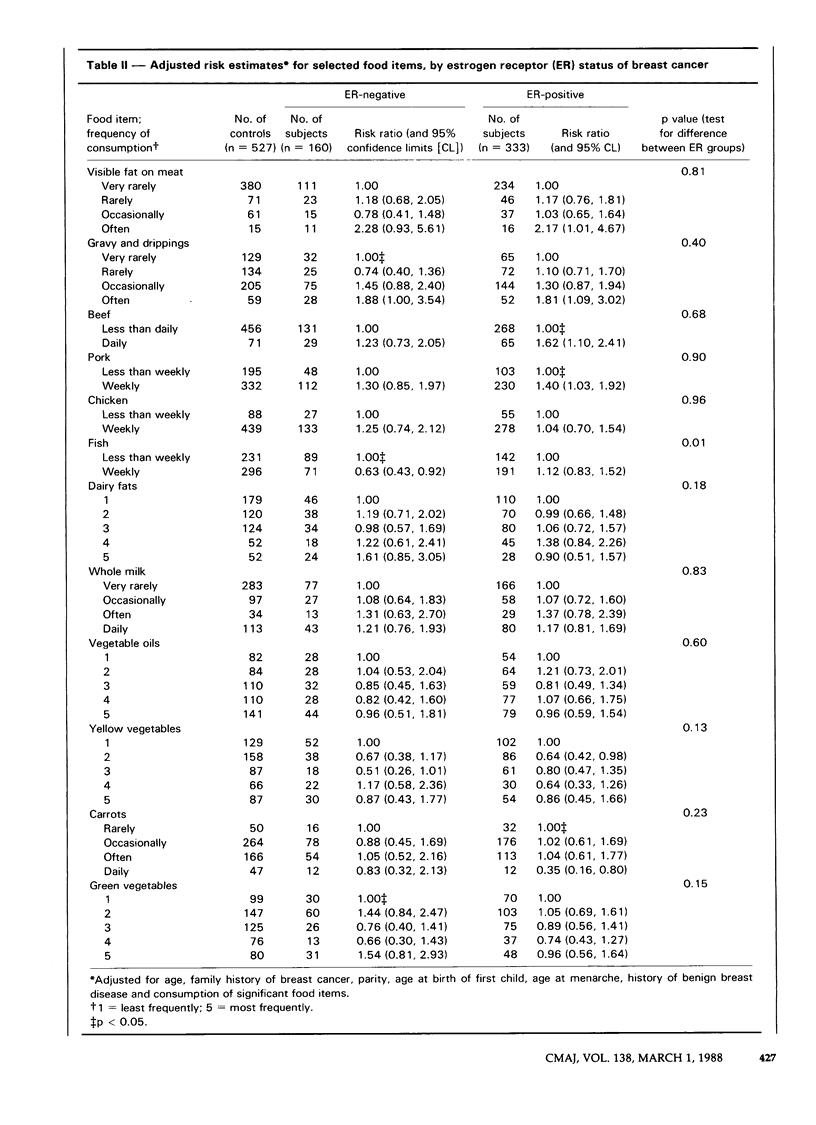
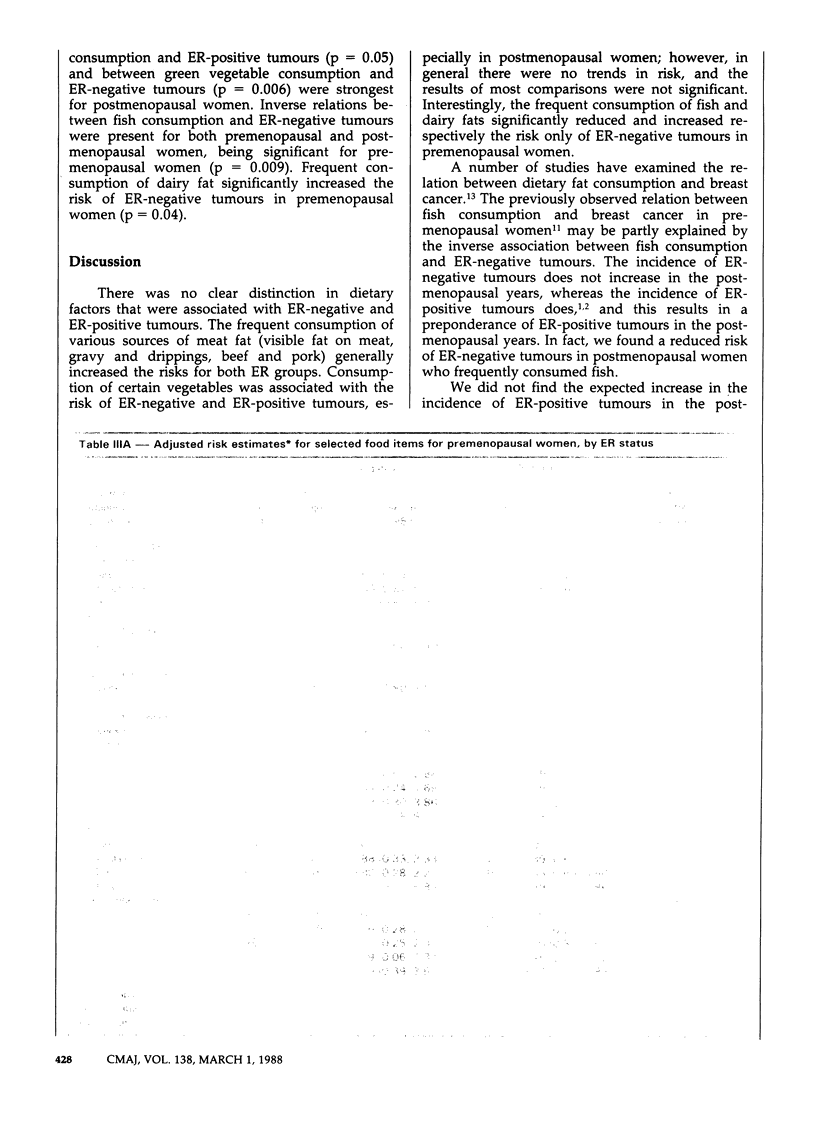
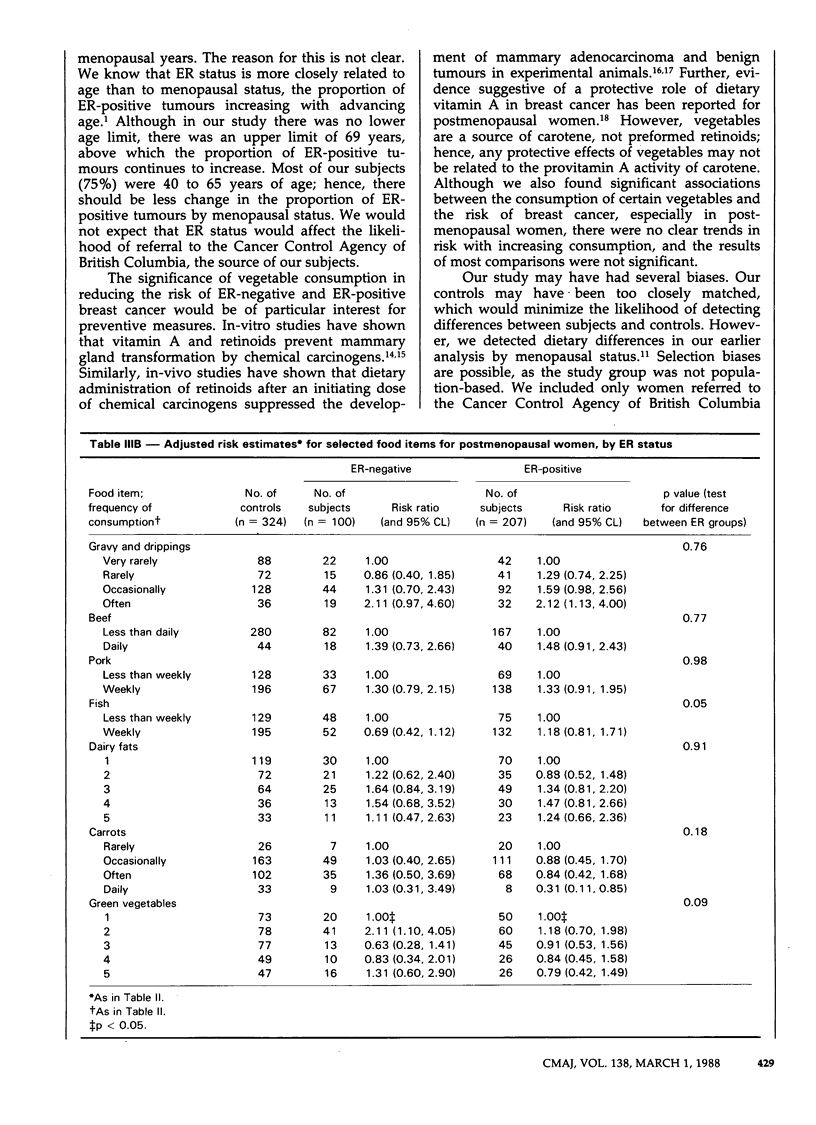
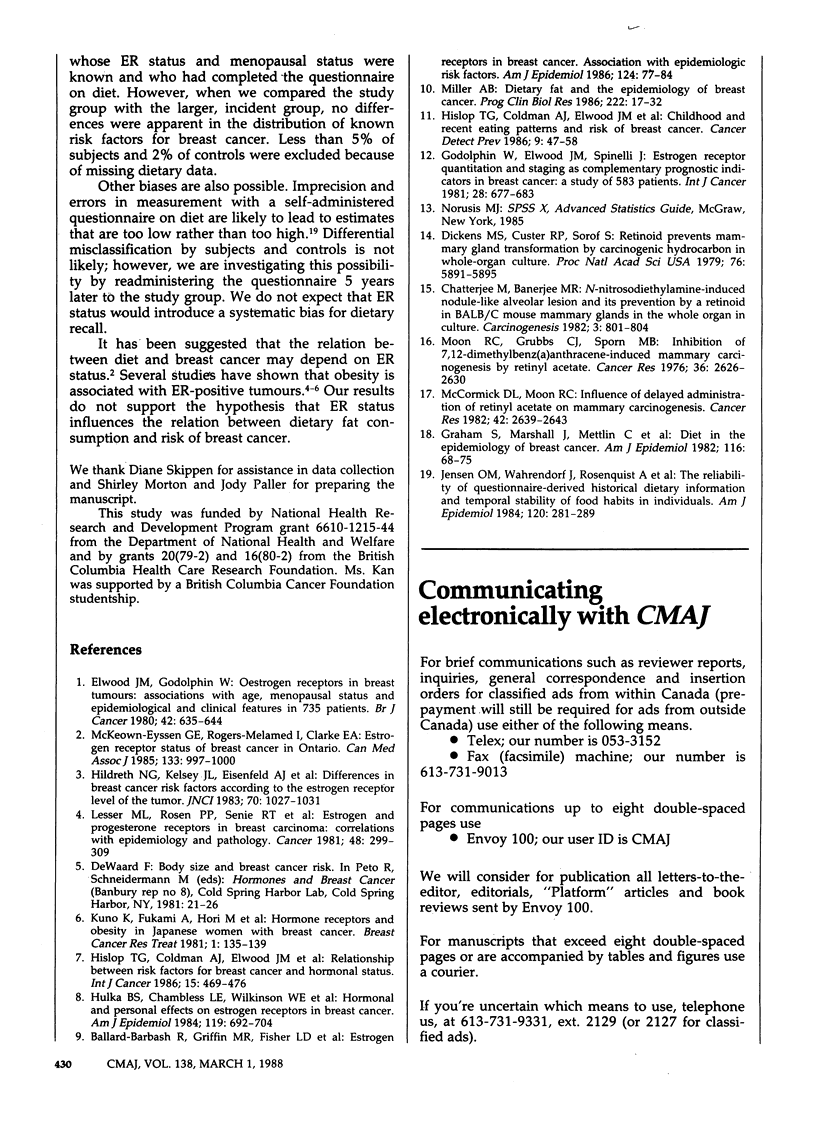
Selected References
These references are in PubMed. This may not be the complete list of references from this article.
- Ballard-Barbash R., Griffin M. R., Fisher L. D., Covalciuc M. A., Jiang N. S. Estrogen receptors in breast cancer. Association with epidemiologic risk factors. Am J Epidemiol. 1986 Jul;124(1):77–84. doi: 10.1093/oxfordjournals.aje.a114372. [DOI] [PubMed] [Google Scholar]
- Chatterjee M., Banerjee M. R. N-Nitrosodiethylamine-induced nodule-like alveolar lesion and its prevention by a retinoid in BALB/c mouse mammary glands in the whole organ in culture. Carcinogenesis. 1982;3(7):801–804. doi: 10.1093/carcin/3.7.801. [DOI] [PubMed] [Google Scholar]
- Dickens M. S., Custer R. P., Sorof S. Retinoid prevents mammary gland transformation by carcinogenic hydrocarbon in whole-organ culture. Proc Natl Acad Sci U S A. 1979 Nov;76(11):5891–5895. doi: 10.1073/pnas.76.11.5891. [DOI] [PMC free article] [PubMed] [Google Scholar]
- Elwood J. M., Godolphin W. Oestrogen receptors in breast tumours: associations with age, menopausal status and epidemiological and clinical features in 735 patients. Br J Cancer. 1980 Nov;42(5):635–644. doi: 10.1038/bjc.1980.296. [DOI] [PMC free article] [PubMed] [Google Scholar]
- Godolphin W., Elwood J. M., Spinelli J. J. Estrogen receptor quantitation and staging as complementary prognostic indicators in breast cancer: a study of 583 patients. Int J Cancer. 1981 Dec;28(6):677–683. doi: 10.1002/ijc.2910280604. [DOI] [PubMed] [Google Scholar]
- Graham S., Marshall J., Mettlin C., Rzepka T., Nemoto T., Byers T. Diet in the epidemiology of breast cancer. Am J Epidemiol. 1982 Jul;116(1):68–75. doi: 10.1093/oxfordjournals.aje.a113403. [DOI] [PubMed] [Google Scholar]
- Hildreth N. G., Kelsey J. L., Eisenfeld A. J., LiVolsi V. A., Holford T. R., Fischer D. B. Differences in breast cancer risk factors according to the estrogen receptor level of the tumor. J Natl Cancer Inst. 1983 Jun;70(6):1027–1031. [PubMed] [Google Scholar]
- Hislop T. G., Coldman A. J., Elwood J. M., Brauer G., Kan L. Childhood and recent eating patterns and risk of breast cancer. Cancer Detect Prev. 1986;9(1-2):47–58. [PubMed] [Google Scholar]
- Hislop T. G., Coldman A. J., Elwood J. M., Skippen D. H., Kan L. Relationship between risk factors for breast cancer and hormonal status. Int J Epidemiol. 1986 Dec;15(4):469–476. doi: 10.1093/ije/15.4.469. [DOI] [PubMed] [Google Scholar]
- Hulka B. S., Chambless L. E., Wilkinson W. E., Deubner D. C., McCarty K. S., Sr, McCarty K. S., Jr Hormonal and personal effects on estrogen receptors in breast cancer. Am J Epidemiol. 1984 May;119(5):692–704. doi: 10.1093/oxfordjournals.aje.a113790. [DOI] [PubMed] [Google Scholar]
- Jensen O. M., Wahrendorf J., Rosenqvist A., Geser A. The reliability of questionnaire-derived historical dietary information and temporal stability of food habits in individuals. Am J Epidemiol. 1984 Aug;120(2):281–290. doi: 10.1093/oxfordjournals.aje.a113891. [DOI] [PubMed] [Google Scholar]
- Kuno K., Fukami A., Hori M., Kasumi F. Hormone receptors and obesity in Japanese women with breast cancer. Breast Cancer Res Treat. 1981;1(2):135–139. doi: 10.1007/BF01805867. [DOI] [PubMed] [Google Scholar]
- Lesser M. L., Rosen P. P., Senie R. T., Duthie K., Menendez-Botet C., Schwartz M. K. Estrogen and progesterone receptors in breast carcinoma: correlations with epidemiology and pathology. Cancer. 1981 Jul 15;48(2):299–309. doi: 10.1002/1097-0142(19810715)48:2<299::aid-cncr2820480215>3.0.co;2-2. [DOI] [PubMed] [Google Scholar]
- McCormick D. L., Moon R. C. Influence of delayed administration of retinyl acetate on mammary carcinogenesis. Cancer Res. 1982 Jul;42(7):2639–2643. [PubMed] [Google Scholar]
- McKeown-Eyssen G. E., Rogers-Melamed I., Clarke E. A. Estrogen receptor status of breast cancer in Ontario. CMAJ. 1985 Nov 15;133(10):997–1000. [PMC free article] [PubMed] [Google Scholar]
- Miller A. B. Dietary fat and the epidemiology of breast cancer. Prog Clin Biol Res. 1986;222:17–32. [PubMed] [Google Scholar]
- Moon R. C., Grubbs C. J., Sporn M. B. Inhibition of 7,12-dimethylbenz(a)anthracene-induced mammary carcinogenesis by retinyl acetate. Cancer Res. 1976 Jul;36(7 Pt 2):2626–2630. [PubMed] [Google Scholar]


